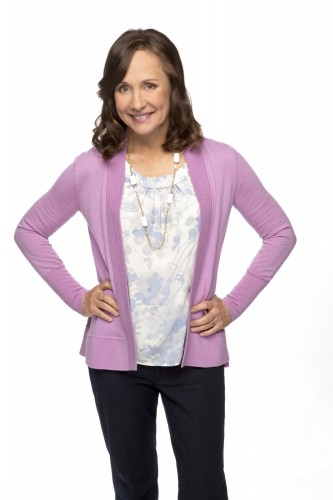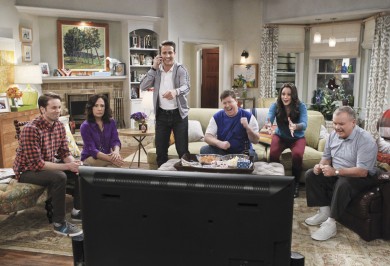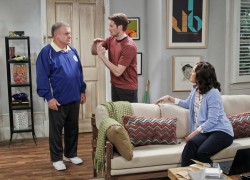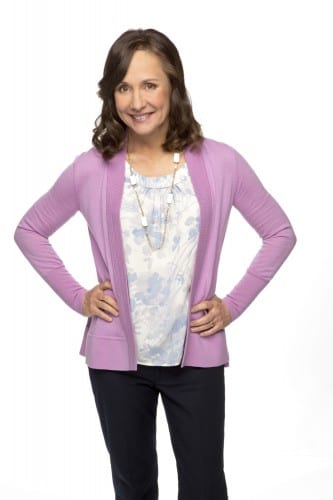 Laurie Metcalf talks roles on gay-inclusive sitcoms. By Chris Azzopardi
Laurie Metcalf talks roles on gay-inclusive sitcoms. By Chris Azzopardi
There’s no question that Roseanne, a show centered on the Conner family, was one of the most influential sitcoms of all time. Just look: Gay marriage is now as trendy as Jackie Harris’ hipster-desired mom couture.
Two decades later, meet The McCarthys, CBS’ primetime comedy about a zany sports-crazed Bostonian family. One of the sons, Ronny, is gay, and the clan’s matriarch is Laurie Metcalf, who played Jackie on Roseanne (and, in case you forgot, was outed during the show’s finale in 1997).
Metcalf recently chatted with our Chris Azzopardi about how The McCarthys — which debuts tonight at 8:30 p.m. on CBS — has made her feel like she’s “missing out” on a real-life gay son, the lesbian kiss on Roseanne that caused a stir, and her own lip-lock with a stage icon, her first time kissing a woman (she thinks).
Dallas Voice: Between HBO’s Getting On and now The McCarthys — and not counting , guest shots on The Big Bang Theory — you’re spoiling us, Laurie. It’s so good to have you back on TV. Laurie Metcalfe: Thanks so much. Yeah, it’s been a long time. I’m spoiled myself right now; I’ve got two wonderful projects. But yeah, I’ve been doing mostly just theater for the past six years.
Which do you prefer: TV or theater? I have to say, I prefer stage, probably because it’s where I came up. I feel like I understand it best, and I like the immediate gratification of a live audience. You know, it’s been so long since I’ve been on a multi-camera show that it just felt like home walking back onto that set, so that was fantastic. I didn’t think one of those would come back around!
What drew you to The McCarthys? First of all, I love that multi-camera format. It’s a very collaborative way of working, because you’re in there with the writers, and everybody is trying to contribute to making the show the best it can be on Friday nights for the audience. It’s a group effort, and I really like working that way. Then I talked to Brian Gallivan, the showrunner, who I adore. He came up from Second City, so I felt we had a little something in common. And he’s fantastic. So calm, so supportive and so wonderful to work with. [The scripts] went through so many changes that I know were very difficult for all the writers involved. He’s just a really fantastic leader and he sets the tone for the whole project, and he’s super funny.
Especially as “Sassy Gay Friend.” When we first talked, I said I was a huge fan of that character and he’s like, “Are you kidding me?” Then we agreed that Sassy Gay Friend should do an intervention at some point on Jackie from Roseanne. Wouldn’t that be great?
Absolutely. You gotta make that happen. Speaking of Jackie, do you find it amusing that her mom style is now a fashion trend among hipsters? That sounds about right! I mean, it’s about time. We had our 25th-year anniversary [in October 2013], for God’s sake.
 How much of The McCarthys is based on Brian’s real-life family? The whole thing is his family. He and his mother watched procedural-crime dramas together, and in The McCarthys we’re fascinated by The Good Wife, so that’s where that bonds exists. The way Brian writes this family — their family humor is so unique to me. I don’t know people like this! I mean, I’m sure they exist — obviously they do — but the non-sequiturs they talk in, and the way they tease each other and the way they misunderstand each other, is so funny to me. And they’re loud and they’re way too needy, but then weirdly totally supportive of each other, which seems to come out of the blue but doesn’t. I really like the family dynamic that he’s recreated from his own family.
How much of The McCarthys is based on Brian’s real-life family? The whole thing is his family. He and his mother watched procedural-crime dramas together, and in The McCarthys we’re fascinated by The Good Wife, so that’s where that bonds exists. The way Brian writes this family — their family humor is so unique to me. I don’t know people like this! I mean, I’m sure they exist — obviously they do — but the non-sequiturs they talk in, and the way they tease each other and the way they misunderstand each other, is so funny to me. And they’re loud and they’re way too needy, but then weirdly totally supportive of each other, which seems to come out of the blue but doesn’t. I really like the family dynamic that he’s recreated from his own family.
What do you think The McCarthys says about the bond between a mother and her gay son? After shooting a few episodes, do you notice a particular connection? Yes! I guess there is one. I mean, I don’t have that in my own family, but it’s so relatable, you know? And it’s fun and it’s light. It just seems like a really fun relationship. I feel like I’m missing out!
Were you ever one of those mothers who wished she had a gay son? I didn’t really ever think about it, but now I do! It’s funny: In our show, the one daughter is sort of the misfit and gets the least attention from the mom, definitely because they don’t have the same bond.
Because the LGBT movement has come so far since Roseanne aired in the ’90s,
how would you compare Roseanne to The McCarthys when it comes to the portrayal of LGBT people? Do you notice a shift in how LGBTs are represented on TV? It was 25 years ago when Roseanne brought gay characters onto the show, and it was a big deal. I mean, she didn’t think anything of it, but it was … it was different. I don’t know what the network thought of it; she had so much pull at the time that she could basically do whatever she wanted. Then she pushed that boundary a little bit with an episode [1994’s “Don’t Ask, Don’t Tell”] where she went to a gay bar with Mariel Hemingway and they kissed. I remember that was a huge deal at the time, and they went round and round about pulling the scene. Roseanne was gonna walk off. It was a huge deal.
Now cut to The McCarthys, and the fact that Ronny is gay is a non-issue. The issue is that Ronny is trying to find a partner because he needs to get out of the house; he needs to break away from his family. They’re all horrified and fearful that he will leave if he’s with somebody, and they don’t wanna lose him. So that’s what I mean when I say it’s a non-issue; it’s just about him dating, and the family is hugely supportive.
 How much of the show revolves around Ronny being gay? I don’t think it’s ever gonna be the A-storyline, though it might be the B-storyline.
How much of the show revolves around Ronny being gay? I don’t think it’s ever gonna be the A-storyline, though it might be the B-storyline.
Roseanne was so ahead of its time in how it portrayed LGBT characters so matter-of-factly. How do you reflect on the influence the show had on the perception of gay people in mainstream culture? I actually have no idea what it did for Middle America. I really don’t. When I think of Martin Mull and Fred Willard as [one of TV’s first gay couples] who got married on the show — I mean, I didn’t realize how big it was. I really didn’t. I was on the inside of it, in a bubble, not knowing. Roseanne knew. That’s why she pushed to do stuff like that. I was very much out of the loop of that. I just saw the humor of it, and I saw these guys who have worked together forever [Mull and Willard both starred on Fernwood 2 Night in the ’70s] and how fantastic it was that she cast them as this married couple.
But in retrospect, you must realize the significance of having a gay married couple on TV in the ’90s, right? For you, what does it feel like to have been a part of a show making big strides for the LGBT community? I was so lucky to be a part of that show for so many reasons. People who talk to me about it, and just because they’re talking to me about it, relate to Jackie. The writing was so high-quality, and still, all these years later, it maintains that level. Every episode, Roseanne [Barr] was just willing to sacrifice laughs to make the show about something. She hit on so many things while also portraying characters, and she just wasn’t concerned about any backlash for anything. To have been a recurring character on a show that did that is one of the highlights of my whole career. I just was so lucky.
Premiering in November on HBO is the second season of Getting On, and Betty Buckley recently talked about the two of you kissing for one of the episodes. She said it was her first girl-kiss. Is this your first girl-kiss, too? I think so, yeah. I mean, I may have done it in a play or something. I don’t know. I can’t remember. But no, I think so. I don’t mean to build it up or something, but the kiss is a metaphor for that show. It’s not a big deal on the show; it’s just something that happens very spontaneously, and then it’s over and you’re like, “What was that?” But it’s odd, and yet it’s kind of funny because you don’t expect it, and it’s kind of weirdly heartbreaking because Betty’s character needs to connect to somebody and it just comes out of her. So, it just runs this gamut of emotions, but then it’s over in two seconds and you think, “Wow, I don’t know how to feel about that.”
I have to reflect on some of the crazy characters you’ve played: Mrs. Loomis in Scream 2, and the nutcase who shot up that grocery store on Desperate Housewives. Is it true that actors live vicariously through their characters? Yes! I get to play a number of freaks, and I don’t know if I’m getting cast as a freak or if I bring my own freakiness to the character. I really don’t know anymore.












